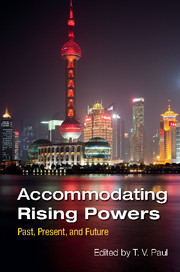Book contents
- Frontmatter
- Contents
- List of figures
- List of contributors
- Acknowledgments
- Part I Mechanisms of accommodation
- 1 The accommodation of rising powers in world politics
- 2 Realism, balance of power, and power transitions
- 3 Globalization, interdependence, and major power accommodation
- 4 What would E.H. Carr say? How international institutions address peaceful political change
- 5 The responsibility to accommodate: ideas and change
- Part II Historical cases
- Part III Contemporary cases
- Part IV Conclusions
- Index
1 - The accommodation of rising powers in world politics
from Part I - Mechanisms of accommodation
Published online by Cambridge University Press: 05 March 2016
- Frontmatter
- Contents
- List of figures
- List of contributors
- Acknowledgments
- Part I Mechanisms of accommodation
- 1 The accommodation of rising powers in world politics
- 2 Realism, balance of power, and power transitions
- 3 Globalization, interdependence, and major power accommodation
- 4 What would E.H. Carr say? How international institutions address peaceful political change
- 5 The responsibility to accommodate: ideas and change
- Part II Historical cases
- Part III Contemporary cases
- Part IV Conclusions
- Index
Summary
The year 2014 witnessed a dramatic upsurge of territorial challenges by Russia in Ukraine and by China in the East and South China Seas, bringing back fears of renewed great power conflicts and rivalries after two decades of relative calm. The need to understand the rising power phenomenon has become all the more urgent in today's world, as the potential for violence is high in both these theaters. 2014 also marked the 100th anniversary of the onset of World War I (WWI). The quick rise of China, a resurgent Russia, and potentially an empowered India and Brazil have brought forward the question of peaceful power transitions in the international system, reminding statesmen of the need not to repeat the mistakes of the twentieth century. China especially has been growing rapidly in both economic and military terms and is poised to replace the United States as the number one national economy in the next decade, while India is expected to reach third position in less than two decades, and possibly second by the middle of the century. Even with lower growth rates than projected, these countries will still be leading economies in the decades to come. In the past, the great economic strength of rising powers led to great military strength, which encouraged them to engage in armed contest with established powers. It is yet to be seen if the current era's rising powers will follow this historical pattern. Although they are unlikely to replace the United States as the preponderant military power in the foreseeable future, it is likely that in the twenty-first century different types of power resources may be vital to claiming global leadership roles. Military strength is unlikely to be the only key source of higher status, as different status markers could be used by states to claim leadership positions. Going by this perspective, the accommodation of these rising powers into meaningful international roles may be necessary to obtain a peaceful international order. Even if the rising powers do not challenge the existing order through war, protracted conflicts and crises could occur, as we are already witnessing in East Asia and Ukraine.
- Type
- Chapter
- Information
- Accommodating Rising PowersPast, Present, and Future, pp. 3 - 32Publisher: Cambridge University PressPrint publication year: 2016
- 19
- Cited by



